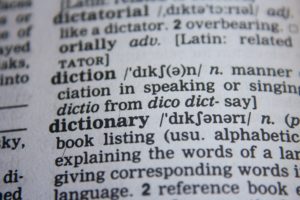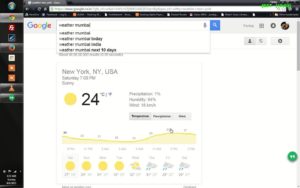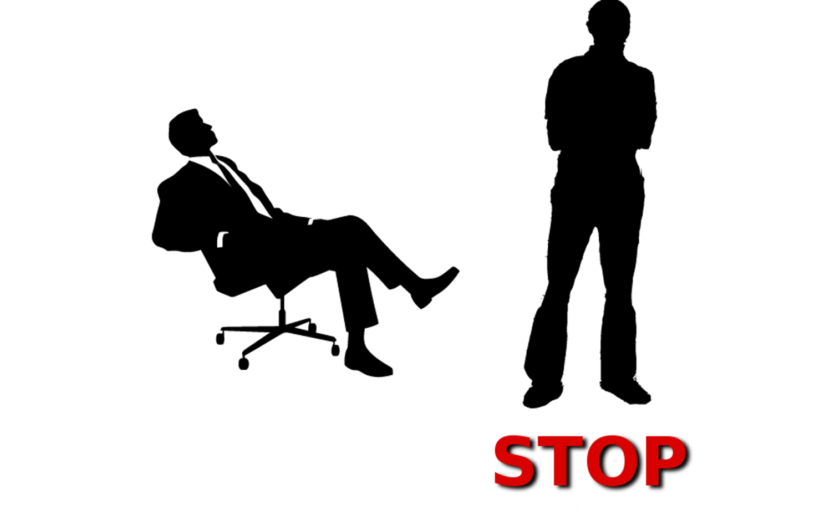Do you get the attention you deserve? Often, people contact me because they feel invisible, ignored, or disrespected. You probably understand.
Tag: Respect
Credibility in 3 Simple Steps
Trustworthiness is not something YOU have. It’s something others perceive. Honest, credible people get overlooked all the time, simply because they do not know how to communicate their credibility.
Continue reading Credibility in 3 Simple Steps
Conversation Resuscitation
Have you ever unintentionally offended anyone? Have people ever misunderstood you? Have you ever felt like you’re forcing the conversation? All three problems have the same solution–conversational preventative resuscitation (CPR).
Myth-buster: YOU matter
It never ceases to amaze me how often professional speakers, presentation skills trainers, and public speaking coaches say that good communication “is not about you,” and then they proceed to talk about themselves.
So which is it? Should you talk about yourself or not? Continue reading Myth-buster: YOU matter
One Question if You Hate Mediocrity
I hate speakers that put me to sleep, I hate presentations with no purpose, and I hate it when the boss requires me to sit through an hour-long meeting that could have been condensed into an e-mail.
Unfortunately, many such presenters think they’re great, but are shockingly mediocre. Let me give you a simple test to know if you are one of those presenters. Continue reading One Question if You Hate Mediocrity
Covert Ego Building
Flattery works wonders! Any good salesman knows how to butter you up. On the other hand, the stereotypical “used car salesman” is transparently insincere. What if you could make people feel better about themselves, and better about you at the same time? Continue reading Covert Ego Building
The Big Lie
The truth I’m about to tell you has lost me a lot of clients and business. People don’t like to be told they’re wrong, and I’m about to contradict your most fundamental assumption about communication.
Two ways to communicate
Whenever you want to communicate a message you have basically 2 choices. You can present your message verbally, or you can write it down. Recorded audio/video can fall toward either end of this continuum.

Here’s the lie:
Communication is the exchange of information.
 Yes, I know, that is the dictionary definition. And yes, I know that communication textbooks start with this basic assumption. That’s why most public speakers and presenters are mediocre.
Yes, I know, that is the dictionary definition. And yes, I know that communication textbooks start with this basic assumption. That’s why most public speakers and presenters are mediocre.
The concept that communication is the transfer of information from a “sender” to a “receiver” is based on a huge, gigantic, enormously presumptive, yet highly improbable assumption–that the “receiver” actually “receives” the message.
It does not matter how much information you speak or how much information you write. If the “receiver” doesn’t actually pay attention and internalize the information, there is no communication!
This underscores the HUGE difference between written and verbal communication.
 With purely written communication the “receiver” of the information is in COMPLETE control–the receiver chooses what to read.
With purely written communication the “receiver” of the information is in COMPLETE control–the receiver chooses what to read.
With purely verbal communication, on the other hand, the “receiver” has almost no control beyond the mere act of lending attention.
A word written (or recorded) gives the “receiver” power to re-read, re-view, and re-wind. A word spoken (and not recorded), disappears into the aether forever, and the “receiver” is denied the power of re-view and re-wind.
The best medium for Information
If you goal is truly to convey “INFORMATION” to someone, what is the best medium? Verbal or written?
Can you earn a master’s degree from any university just by sitting in the lecture hall? Or do you have to do a lot of reading?
If you had one million dollars to invest, would you give it to the friend that “told” you verbally about a great idea, or the other friend who “told” you verbally about a great idea, but had all the information to back it up written down in a business plan?
 What’s the fastest way to get the daily weather forecast? Watching the TV news or googling it?
What’s the fastest way to get the daily weather forecast? Watching the TV news or googling it?
In the time it takes the weatherman on TV to verbally “report” the weather forecast for the morning commute, you could have read a written, 10-day, hour-by-hour forecast for three different cites on three different continents.
The most important rule of great communication is simple:
WRITTEN media work best for INFORMATION
Verbal communication maxes out at about 150 words per minute. Whereas, even bad readers manage 200 words per minute. Good readers top out at over 600 words per minute.
Written words give you more information faster–and you have complete control of how, when, where, and to what to pay attention. Most importantly, the receiver can rewind, repeat, and review written messages!
VERBAL media don’t convey INFORMATION well
In a one-on-one conversation, verbal media convey information okay, because both parties are talking, asking questions, and giving feedback.
In a group presentation setting, you almost always lose most of that back and forth.
When the message is delivered verbally to a group, any one “receiver” only has to tune out for a mistimed hunger pain and the entire logic of the speaker will by interrupted.
When there is no rewind button, every second counts, and the sad truth is the every “listener” tunes out for more than just one second.
Public speaking is not about INFORMATION
More than any other principle I teach in my classes, people want to argue with me over this. People really want to believe that the speaker’s goal is to teach INFORMATION, explain INFORMATION, and organize INFORMATION.
Of course all presentations, even verbal, convey some information. I’m not denying that. I’m talking the about your goal.
Every public speaking class and textbook I’ve aver seen begins with the premise that a speaker’s goal is either to entertain, persuade, inspire, or inform.
I’m sorry to tell you, but that’s total baloney!
You can entertain, you can persuade, and you can inspire, but NOT INFORM. If your goal is to INFORM, I guarantee you that you are a mediocre speaker.
I know this with 100% confidence because if you really truly expected me to understand and remember INFORMATION, you would give me the INFORMATION in a format that best helps me receive INFORMATION–you would write it down!
 Trying to INFORM me verbally uses the wrong tool for the job.
Trying to INFORM me verbally uses the wrong tool for the job.
If you want to pound a nail, use a hammer. Any contractor who tries to build my house with a spoon, cannot be the best builder, and will be fired.
I don’t care how many textbooks talk about using presentation skills to INFORM. You cannot be a great presenter if that is your goal. The best you can hope for verbally is PERSUADE me to agree with your information or INSPIRE me to learn more information.
Let me repeat. I’m not saying that you don’t convey some information, I’m saying that should not be your goal.
The benefits of VERBAL Communication
The truth is that when I give an 8 hour seminar, I actually present very little INFORMATION. If written down, an entire 8 hour workshop could be read and understood in about 30 minutes.
So why do people sign up for classes, go to workshops, and pay for seminars? Despite what they tell themselves, it’s not for information.
People commonly pay $25 for an expert’s book, but pay $2,500 for a chance to see the same expert explain the book in person. Why? The book has more information than the 8 hour seminar!
People listen to live speakers for improvisation, connection, live expertise, customization, and personality.
Verbal communication provides something that written information cannot duplicate–INTERACTION!
Choose the right tool for the job:
Speak It

Write It
What’s the alternative
When the CEO calls you into the office and asks you to present information, it’s a lie.
 It’s not intentional. In the CEO’s mind, he/she really does want information–but YOU can’t look at it that way!
It’s not intentional. In the CEO’s mind, he/she really does want information–but YOU can’t look at it that way!
If the CEO really wanted INFORMATION, he/she would ask you to draw up a written case study, written budget proposal, or written report. That’s INFORMATION!
When you’re called into the boardroom to present verbally, does the CEO really want you to read all the information from the written report? NO! Absolutely, NO!
The reason you’re asked to present is because the CEO wants INTERACTION! He/she wants to ask questions, wants to see your confidence level, and wants to see other team members’ reactions!
The reason you’re asked to present instead of write, is not because the CEO wants MORE information, it’s because the CEO wants LESS. In person, the CEO expects you to be able to summarize everything you know and recommend in the simplest possible way.
The CEO doesn’t care about every bit of informational minutia. He/she does want to hire someone else–you–who does.
You are not presenting because the CEO wants the information for him/herself. You are presenting because the CEO needs to know that he/she can trust YOU with the information.
The CEO doesn’t want to read the report and memorize all the information–that’s not the CEO’s job–the CEO needs only INTERACT with you long enough to get an IMPRESSION of what you are going to do about it.
You may be asked to deliver INFORMATION verbally, but if you want to be a great presenter, you can’t look at it that way. In your mind, the goal is not to present the right INFORMATION. You’re goal should be to INTERACT in the way that makes the right IMPRESSION.
In the SpeechDeck communication system, all presentations start with black and white principle: Clarify Your Content. The most important part of clarity is reducing your information to a single sentence.
The number one secret to verbal presentation:
Use LESS information
Why You Lose Credibility
When you present facts like your giving a sixth grade book report, you sound like a sixth grader. So why do most people still approach public speaking like they’re giving a sixth grade book report?
If You Only Do 1 Thing To Make a Good Impression
When a client preparing for the Governor’s convention and my wife preparing to talk to the women at church asked me the same question, I found myself giving them the same answer. Continue reading If You Only Do 1 Thing To Make a Good Impression









